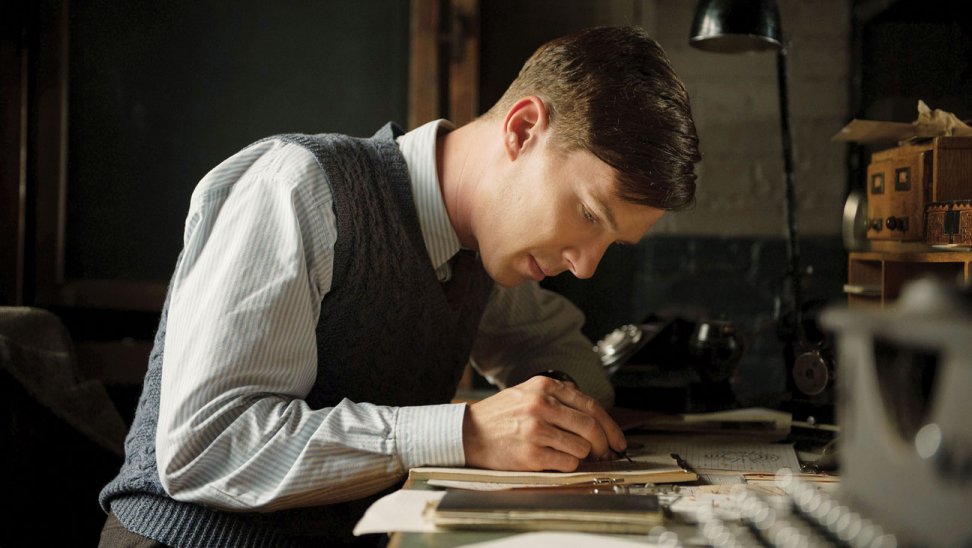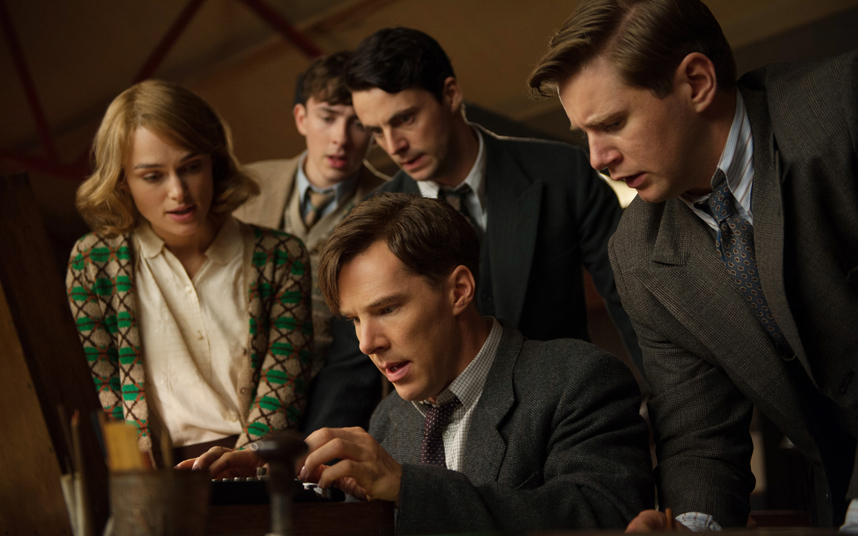
Alan Turing: “I’m just a mathematician.”
Joan Clarke: “Sometimes it is the people no one imagines anything of, who do the things that no one can imagine.”
The Imitation Game tells the story of Alan Turing, the English math genius who cracks the Enigma code, which helps turn World War 2 in favor of the allies.
In the 1940s, Enigma machines were used by the Germans to encrypt and spread critically important war messages. While the use of conventional radio frequencies allowed Germany’s woes to intercept these coded messages easily, they were nearly impossible to decipher unless the correct Enigma settings were known. The catch? The Germans were changing the Enigma settings daily. So even if a code-breaker deciphered a message today, he wouldn’t be able to do so tomorrow. Perhaps simple combinatorics would help? Not really, given that the possible options for setting up an Enigma are:

This fascinating story of numbers, complexity and human ingenuity is what made The Imitation Game my new favorite movie. Another reason why I like it so much is because it has a lot in common with the way we do things here at DELMIA Quintiq.

“I like solving problems, Commander. And Enigma is the most difficult problem in the world.”
When Alan Turing applies for the top-secret job of a code-breaker, he has only one thing on his mind: His passion for puzzles. A math genius from an early age, Alan’s only motivation to get involved in the war is the opportunity to solve the world’s most difficult puzzle at that time – much like Dr Victor Allis, founder and CEO of DELMIA Quintiq, who’s been a puzzle fanatic all his life.
DELMIA Quintiq exists to solve the world’s most complex planning puzzles. Sure, we enjoy solving simple problems too but it’s the complex ones that really get us excited. Planners with a dozen spreadsheets might be able to create a feasible enough plan for a factory with 10 machines, a logistics company with 50 trucks or an airport with 50 security staff, but what happens when there are complex operations with thousands of machines, thousands of trucks or tens of thousands of employees? That’s the kind of complexity we puzzle-solvers live for.
Solving the impossible – in less than 20 million years
At some point in the movie, Alan Turing measures the amount of human effort needed to break the Enigma code so that every coded message may be decoded within a reasonable timeframe. The amount comes up to a shocking few hundred years!
What is more perplexing is that prior to Alan’s appointment, the whole team of code-breakers were focused on deciphering the code on a day-to-day basis. They were relying on the brute force approach to achieve the unachievable. That’s why this top-secret program has remained unsuccessful for two years. From day one, Alan focuses his attention on the algorithms and the shortcuts that would allow him to break the Enigma code every day. The result of his efforts is Christopher – the “smart” machine used for cracking Enigma messages.
DELMIA Quintiq has a similar approach to solving planning and optimization puzzles. While it’s impossible for the human brain to solve a combinatorial problem of this size using the brute force approach, the human brain can come up with the algorithms and formulas that shorten the code-breaking process. That’s precisely what Alan Turing did. And that’s how DELMIA Quintiq continues to solve the world’s planning puzzles.
Stewart Menzies: “Six minutes…is that even possible?”
Alan Turing: “No, it takes me eight.”
When it comes to recruiting smart people to join his team, Alan has a simple solution. A crossword puzzle is published in the most popular newspaper with an invite to readers to solve it under 12 minutes. All successful candidates are then invited to a second round of puzzle-solving.
Alan’s approach to recruitment, while unconventional compared to how most companies hire people these days, is much like how we do it at DELMIA Quintiq. Our ComBUStion! Puzzle challenges the player to manually create an optimal roster for 11 bus drivers. In addition to challenging themselves and having a lot of fun, the best players are also invited to an interview with DELMIA Quintiq.
When Alan Turing set himself the task of breaking the “unbreakable” Enigma code, he had a healthy disregard for the impossible. In a similar way, everyone at DELMIA Quintiq has a bit of Alan’s “Let me try and we’ll know for sure, won’t we?” attitude. It’s the very same attitude that has enabled us to break not secret codes but a few dozen optimization world records.
What are your thoughts on code-breaking vs. puzzle-solving? Let us know in your comment below or drop Hristina a tweet.
Image credit: The Imitation Game
